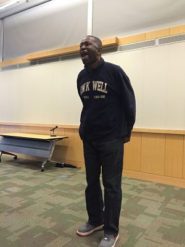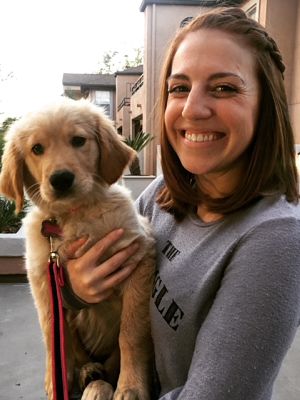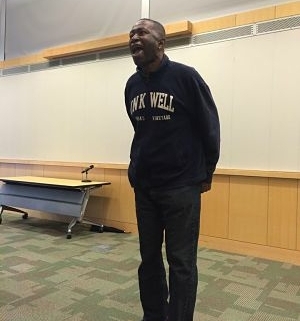Litdish: LeVan D. Hawkins, Writer, Poet, Performance Artist

LeVan D. Hawkins is a writer, poet, and performance artist formerly of Los Angeles and based in Chicago. In Chicago, he has appeared at the You’re Being Ridiculous storytelling series at Steppenwolf Theatre, Links Hall, the Homolatte Reading Series, This Much Is True Chicago, OUTspoken!, Fillet-of-Solo-Storytelling Festival, and Center on Halsted. Hawkins’s prose has appeared in such publications as EDNA: The Magazine of the Millay Colony of the Arts, Lunch Ticket, Bleed literary blog, LA Times, LA Weekly, LA and SF Frontiers, Sante Fe Reporter, and Sacramento News and Review. A MacDowell Colony of the Arts fellow and MFA recipient from Antioch University Los Angeles, he has traveled across the country reading and performing and has appeared in the New York International Fringe Festival and the National Black Theater Festival. In LA, he has performed at venues such as the UCLA Hammer Museum, Redcat Theater at Disney Hall, and Highways Performance Space. He is currently completing his book, What Men Do.
10 Questions for LeVan D. Hawkins:
1. What inspires you the most in terms of your writing and performances?
I’m sitting here battling with definitions. Am I being asked what inspires me or what influences me? Or does she want a combination of both? I’m going to cheat and go with influence. Church comes up. Not necessarily what was said in church, but the rituals, the presentation. I grew up in the church much in the way James Baldwin did. His “Go Tell It On The Mountain” reflects my life more than any other book; yet as I think about this statement, my mind is downloading all the ways I am different. I’ll say this: I read that book at fourteen and recognized its authenticity and DNA. In his essays, he combined anecdote with fact. Baldwin used his life in his work, who he was, what he had experienced. The good son, the animosity you face being that, the obligation of being anointed with talent by God at an early age, his gayness that I recognized in the main character’s admiration for Elisha, the young minister. So, yes, the church. More so, the black church. The theater of it, the emotion in the sermons, the objective of sharing stories to make the world better, the repetition ministers use to stir the congregation, the call and response from the congregation when they are moved, the intensity of the singing, the squalls, the majesty of the Bible verses. It is where I come from though I recognize how often religion is twisted to oppress people and that there are inconsistencies and contradictions and sometimes a lack of clarity in the storytelling, things I would be dinged for in my personal writing.
2. Was there a specific person who inspired you?
Ok, I’m going to cheat again and say, excellence inspires me. Artists who are dedicated to their craft and who give their all excite me. I saw playwright and performance artist Luis Alfaro do a presentation and Q & A at Victory Gardens Theatre in Chicago and he just blew me away, his innovation, his passion for work and his community. Playwright and actress Charlayne Woodard is one of my sister friends. To see how hard she works, to see how she’s always improving, is inspiring and life-changing. They are my standards. I’m honored to call them “friend.” Influence? My aunt, our church clerk, a leader of charity organizations, a village trustee who was always writing, giving speeches, researching, producing shows, and advising me on presentation when I was young. I gave my first speeches, my first poetry readings at church at six or seven.
Grit your teeth and bear it. You don’t have to do what they recommend; they could be wrong. But respect the notes and consider their points. This process helps you develop good taste, which is necessary for making choices.
3. What’s the most recent thing you’ve written and/or performed?
I recently wrote and performed a story for the You’re Being Ridiculous storytelling series at Steppenwolf Theatre in Chicago for Pride month. I studied the work of acclaimed storytellers before I began. I wrote about a church adversary, both of us smart, ambitious, and gay. We should have been friends, but we were sworn enemies. He later returned to church as a trans woman. That was the impetus for the story.
4. What’s your writing process like?
I begin by pondering—there’s always the danger of that going on too long—then I sit down and free associate and write everything I think or remember about my subject. I type that up then expound on what I’ve written, write transitional observations, stories, and anecdotes. I’ve never had any trouble coming up with material, though sometimes it’s difficult to simply begin. I repeat the process. I keep working attempting to make the words flow into words creating stronger sentences or thoughts. Then I focus on making the sentences flow creating paragraphs with intention; the aim is for the paragraphs to flow creating the through-line for the piece. Through-line is more of a theater word, I suppose, but that’s how I think. Then I try to clean up the language, work on rhythms, and make the writing sound like I’m thinking and speaking, which is important for me. I am influenced by public speaking, theater, and film. I keep working on my vision until time runs out. Very rarely I am done. Occasionally, I’m impatient and will send something out too early. Mistakes are part of growing. My goal this year is to spend more time on polish.
5. What advice would you give to emerging poets and writers?
Allow yourself to be bad—I love the chapter, “Shitty First Drafts” in Anne Lamott’s Bird by Bird. Don’t censor in those early drafts, just transcribe what you’re thinking, seek seemingly unrelated items that give power to the points you’re trying to make. Read your work aloud as much as you can. Keep asking what is this sentence, paragraph, chapter, book about? Find fellow writers you respect and ask them for notes. Do the same for them. Seek out hard-to-please writers. Writers who will give you specific feedback not assuage your insecurities. And don’t defend your work when you receive it. Grit your teeth and bear it. You don’t have to do what they recommend; they could be wrong. But respect the notes and consider their points. This process helps you develop good taste, which is necessary for making choices. Don’t give anyone the first drafts of your work. Sweat a little before you send it out. When you’re pleased, find an open mike and read an excerpt that has a beginning, middle, and end. And I know it seems cute to go on and on about our neurosis and procrastination (maybe a little too much of that in Bird by Bird), but you really must get some words down.
6. What are you reading right now?
I am reading This Boy’s Life by Tobias Wolff, for the third or fourth time. I’m examining the ways Wolff created himself as a multi-dimensional character. In the book, he’s semi-thuggish but yearns to be good. Who this character is, is evident at the end of the opening scene and continues to the end. The narrator is self-aware, reflective, admits to his flaws, and plays up his contradictions and shortcomings all the way through. Wolff plays up this dichotomy until he makes his transition into adulthood.
Some writers seem to forget their own character development—I’m referring here to first person non-fiction. It’s easy to do—it requires some emotional distance to access who we are as human beings. It doesn’t have to be completely true but there needs to be truth in it. Some don’t use enough well-executed motifs for me to remember what’s important for me to take away. We view ourselves as these steadily-evolving beings, but change is slow; there is more character consistency in our behavior than we wish to admit. I don’t think one anecdote illustrating character followed by a lot of “then this happened” and “this happened” without finding ways to return to revealing character and its nuances is enough.
If I had one day to live, what do I want to leave behind as my last words? Knowing I won’t be around for the clapback. Knowing I must be clear because I won’t be around to get my point across. Whatever I come up with, that’s what I should be writing about. Today, I say my last words would be about communication and the necessity of empathy.
7. How do you prepare for a performance?
At least once, I slowly go over the manuscript in terms of words to sentences, sentences to paragraphs, and paragraphs to through-line. What is the purpose of the word, sentence, paragraph, through-line? Writing and performance are similar. If something doesn’t read well, something’s probably wrong. If you can’t remember it, perhaps it’s because on a subconscious level, something’s wrong with the thought process behind the words, they’re not flowing in a logical manner. I am constantly editing as I rehearse. I try to read the manuscript aloud as much as possible. Fast, slow, exaggerated voices, anything to break it up and come up with new line-readings. Who am I talking to? What needs to be emphasized so there’s a payoff ? What’s the intention of what I’m saying? When does it change?
I mark my manuscript for stress and emphasis, but my goal is do the work at home then get up on the stage or behind the podium and just let it rip. Don’t be married to the work done in rehearsal. I am attuned to the audience, my scene partners. I compare interacting with them to having sex and being aware of my partner’s responses to what I’m doing. You switch up, emphasize, slow down, speed up when it’s good.
8. What the most important thing you want to get across in your writing and performances?
I want to take you into my thought process, my head, my life. I attempt to tell what happened and what I see and how I felt in that moment without adding a lot of editorial.
9. What are your interests outside of the literary world?
So much of my time is taken up focusing on looking after my mother who has dementia. As in writing, there are actions involved in caregiving that go beyond the obvious. Doctors, deciding who to listen to, ordering medicine, giving medicine, shopping, cooking, cleaning, paying house bills, etc. In writing, there’s reading others’ work, keeping up with current events so you can know what people are going through and what they need, applying for grants and fellowships, reading your friends’ work, writing book proposals, doing research etc. When is there time for anything else? Though this writer could use some romance.
10. If you could ask yourself any question, what would it be and what would the answer be?
If I had one day to live, what do I want to leave behind as my last words? Knowing I won’t be around for the clapback. Knowing I must be clear because I won’t be around to get my point across. Whatever I come up with, that’s what I should be writing about. Today, I say my last words would be about communication and the necessity of empathy.
 Kristina Ortiz is an elementary school teacher and MFA candidate at Antioch University Los Angeles, where she is the associate managing editor and web team manager for the literary journal Lunch Ticket. She lives in Ventura County, California with her fiancé, golden retriever Bella, and cat Lara.
Kristina Ortiz is an elementary school teacher and MFA candidate at Antioch University Los Angeles, where she is the associate managing editor and web team manager for the literary journal Lunch Ticket. She lives in Ventura County, California with her fiancé, golden retriever Bella, and cat Lara.





